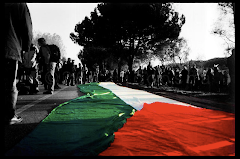Gaza survivors' four days without water
By Rushdie Aboualaf
Sameh, aged three, and Ahmad, 18 months, cry all the time.
As she sits on the bed in al-Quds hospital in Gaza City, their mother Fatima al-Shamouny, 36, tries to comfort them.
But as she tells their - and her own - story, she sobs too.
The boys were found on Wednesday, with their dead father and unconscious mother nearby, four days after the emergency services said they began trying to reach the neighbourhood.
They were among 30 people Palestinian Red Crescent workers said they evacuated from Zeitoun, a south-eastern suburb of Gaza City, on Wednesday.
The International Committee of the Red Cross (ICRC) said the paramedics found "shocking" scenes of wounded people huddled together in houses among dead bodies, weak after having had no food or water for several days.
In one home, the agency said, four small children were found sitting close to their dead mothers, "too weak to stand on their own".
It is not clear if Sameh and Ahmad were in that particular house - it may be that the unconscious Fatima was initially thought to be dead - but she says she and her toddlers were among those who had a long wait for help.
Survivors' accounts
The ICRC has accused the Israeli military of failing to live up to its obligations under international law to facilitate the evacuation or to care for the wounded.
The agency said it had been requesting safe passage for its ambulances to access the neighbourhood since 3 January, but only received permission to do so from the Israeli Defence Forces (IDF) four days later.
The details of exactly what happened at the Shamouny family compound are still sketchy. Survivors have told the BBC that 26 of the extended family's 65 members died in Israeli military operations.
Their accounts of shelling, and then ground troops surrounding their homes, cannot be independently verified.
Fatima, who was wounded in the chest, says two of her sons, her husband, her aunt, her uncle and her brother-in-law were all killed.
"One of my sons crawled to our neighbour's house - he was injured - and he called some of the local radio stations to ask for help. But the help arrived late. Everybody had died," she said. "On the third day, I passed out. I don't know what happened until I found myself here in the hospital," she said.
Wael Faris al-Shamouny, 39, another member of the extended family, smoked and sipped black coffee as he sat on the floor in the hospital corridor.
He says he lost five sons and his wife, and believes some of the dead may have survived if given medical treatment earlier.
"We tried to help them, but we didn't have first aid things in our house. We spent days without food, without water - the wounded were bleeding for four days," he said. "The ambulances came and they saved who they saved. There are still pieces of my wife, my sons and my cousins' bodies in the house."
ICRC criticism
The ICRC said the wounded had to be transported about a kilometre on a hand-pulled donkey cart because large earth walls erected by the Israeli army had made it impossible to bring ambulances into the neighbourhood.
Katarina Ritz, the ICRC's head of mission in Jerusalem, said experienced Palestinian emergency workers wept at the scenes they were confronted with.
She said Israeli troops were within about 100m of the houses in question, and that the ICRC believes the soldiers "must have been aware" of the presence of the wounded people, because of repeated requests from aid agencies for access.
Under international law, she said, even if there are security concerns meaning the injured cannot be evacuated, "the minimum is to treat these people, to feed these people, give them water, and keep them in a safe place".
The Israeli military said it was investigating the case. It said it is "engaged in a battle with the Hamas terrorist organisation that has deliberately used Palestinian civilians as human shields". And it stressed it works in "close co-operation with international aid organisations during the fighting, so that civilians can be provided with assistance".
'Difficult' co-operation
Earlier in the week, an ICRC spokeswoman told the BBC attempts to co-ordinate safe passage for ambulances were so slow that people were dying as they waited.
Not all ambulance drivers in Gaza have been waiting for co-ordination with the Israeli military, and health officials in Gaza say 10 paramedics have been killed trying to rescue the wounded since the Israeli operation began.
Israeli Defence Ministry Spokesman Peter Lerner said that co-ordinating the movements of ambulances has been "extremely difficult because of heavy gunfire".
He said that even during the three-hour lull Israel declared to allow humanitarian operations, Hamas militants continued to shoot at Israeli forces.
Outside the hospital, as Fatima Shamouny told her story, dozens of people gathered as Thursday's ICRC-led convoy of ambulances prepared to leave. They came with addresses where they believed injured people were trapped.
One man's hands shook so much with fear that he had to ask for help writing the directions down.
Finally, the convoy received clearance, and drove away.
It was headed back to Zeitoun, where the ICRC said there were reports of more injured people stranded, and another area in northern Gaza, which ICRC workers had not even reached yet.










No comments:
Post a Comment